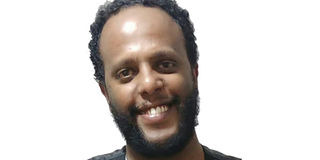Prime
Overlooked facts about Israel-Gaza conflict

What you need to know:
Mr Katagata wanted to tell us a sanitised version of modern history of Israel.
On May 19, Daily Monitor came published an Op-ed piece by Patrick Katagata Jr. titled, ‘Exploring history of the Israel-Gaza Conflict.’
Mr Katagata sets out to explore the history of Israeli-Palestinian ‘conflict’ to throw light on the alarming developments of the last two weeks. However, the author neither tells the history of the ‘conflict’ nor explains the immediate triggers for the unfolding human tragedy we have witnessed in real time.
For a start, the attempt to frame the problem as an “Israeli-Gaza conflict” and to portray what has been going on as a drama of strikes and counter strikes between Israel and Hamas is simply wrong.
Anyone who is following the news knows well that the State of Israel is currently facing a pan-Palestinian resistance. From the besieged Gaza strip to the occupied territories of East Jerusalem and West Bank to inside Israel proper; Palestinians have risen up in protest.
It all began in occupied East Jerusalem where a popular Palestinian protest flared up in Opposition to Israel’s plan to forcibly evict around 2,000 Palestinians from a couple of neighbourhoods in the city.
The largely peaceful protests were met with waves of violent crackdown by Israeli security forces including brutal attacks inside Al-Aqsa mosque. The fight, unequal as ever, was being fought for days between Palestinian civilians and ludicrously armed Israeli security forces in the streets of the occupied cities before Hamas decided to join the fray.
Thus, contrary to what Mr Katagata wants us to believe, the recent events show that what is currently happening across historic Palestine is not a conventional ‘conflict’ nor is it reducible to the showdown between Israel and Hamas whom the author described as having “long history of conflict for various reason(s).”
What we are witnessing is a Palestinian people’s resistance against continued colonial occupation and apartheid, on the one hand, and an unjustifiable show of force by Israel to perpetuate a settler colonial rule, on the other.
If one wants to ‘explore’ the history of the ‘conflict,’ numerous starting points present themselves. We can start telling the story, as MrKatagata does, from “time immemorial” and/or “biblical times” but this would take us nowhere.
This is not to deny that Jewish people had spiritual and historical connections with the historic Palestine. They did. There are also Arab-Jews (the Mizrahim) who lived in the land throughout the epochs that the author chronicled in his article.
Yet, by Katagata’s own admission, Israel is a modern state as any other. And the proper starting point to tell the story should be the emergence of Zionist movement in 19th Century- a movement which advocated and enabled the establishment of that modern nation-state.
Zionism is a political movement born out of the brazen anti-Semitism and militant nationalism of modern Europe. To redress Jewish oppression in Europe, the movement envisioned Jewish nation-state elsewhere, preferably in Palestine; while it should also be remembered that Zionist leaders seriously considered other options including the 1903 British offer for Jewish settlement at the heart of Uganda protectorate.
The search for a Jewish homeland necessarily involves appropriating an already occupied land - including through expulsion of the existing population- and/or imposing a new political order upon them.
That’s what we call settler colonialism and that’s what transpired in Palestine in 1948 where around 750,000 Palestinians were forced to leave their villages and towns never to return. The massive expulsion paved the way for the establishment of the state of Israel which Palestinians remember as a Nakba, catastrophe.
The Nakba is not, of course, a one-off event; it is an on-going tragedy. Following the 1967 War and subsequent developments, millions of Palestinians are being forced to live under unrelenting occupation (West Bank and East Jerusalem), concentration enclaves (Gaza strip) and scattered refugee camps.
The recent evictions of Palestinian families from the Sheikh Jarrah neighbourhood in the occupied East Jerusalem is but the latest in the 70 plus year-old Nakba.
In forcefully and synchronously protesting against the evictions, Palestinians are protesting together against the degrading treatment of Arab-Israelis under the apartheid rule in Israel proper; they are protesting against the 15-year-old siege of Gaza strip and they are protesting against the day-to-day life under occupation in West Bank and East Jerusalem.
They seem to realise that despite their different experiences they are facing the same adversary- the settler colonial system. Instead of highlighting that side of the story, Mr Katagata wanted to tell us a sanitised version of modern history of Israel.
A story that narrates how a small country with little resources fought and defeated all its enemies- a story that conveniently forgets the fact that the Zionist movement was essentially incubated by British Imperialism and that the state of Israel is a recipient of billions of dollars’ in military aid from USA, not to mention the exceptional status it enjoys in international law and international relations.
International pressure seems to have bore fruit and a ceasefire is in effect.
This will at least end the gusty bombing of Gaza Strip by Israeli army which so far have claimed the lives of 230 Palestinians including 65 children. It will also stop the indiscriminate firing of missiles from Gaza towards Israel which killed 12 Israelis.
To paraphrase prime minister Netanyahu, ‘quiet’ might be restored; yet quiet does not mean peace.
The latter should come only when the majority of Israeli public realise that their security and well-being is better served not by sustaining the unsustainable colonial system but by agreeing to a formula or formulae that enable them to share freedom and equality with their Palestinian neighbours.
Salahadin Ali is a PhD student at Makerere Institute of Social Research and a member of Progressive International.



